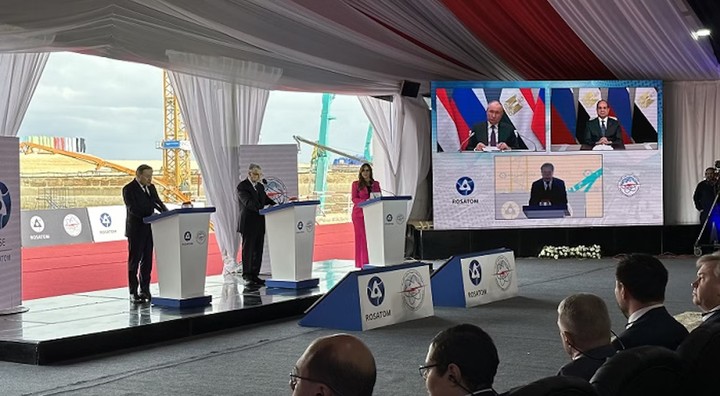The Presidents of Russia and Egypt participated in a ground-breaking ceremony for the construction of Egypt’s first ever Nuclear Power Plant (El Dabaa NPP), Anadolu Agency reports.
Russia’s Vladimir Putin and Egypt’s Abdelfattah Al Sisi via online video link poured foundation concrete of the fourth and final reactor of the NPP, developed by the Russian State Atomic Energy Corporation (ROSATOM) in Egypt’s Mediterranean Dabaa city in Marsa Matrouh province, located about 320 kilometres northwest of the capital Cairo.

Putin said the joint project will contribute to the development of the Egyptian economy, provide it with additional energy resources and contribute to building new enterprises and employment generation.
First concrete has been poured for the foundation slab of Unit 4 at the El Dabaa nuclear power station in Egypt, marking the official start of construction, Russia’s state nuclear corporation Rosatom said.
A ceremony to mark the pouring of first concrete was attended by videoconference by Russia’s president Vladimir Putin and Egypt’s president Abdel Fattah Al-Sisi. The event was attended by dignitaries including Egypt’s prime minister Mustafa Madbouly and Rosatom’s director-general Alexey Likhachev.
Rosatom said the four-unit El Dabaa nuclear station, west of Alexandria on Egypt’s northern coast, is the largest nuclear construction project on the African continent.
Likhachev told Tuesday’s ceremony that El Dabaa is the largest cooperation project between the two countries since the construction of the Aswan Dam. He called the project “a significant event in the history of nuclear energy in Egypt and Russian-Egyptian relations”.
Africa’s only other commercial nuclear power station is the two-unit Koeberg near Cape Town in South Africa.
Russia is supplying four Generation III+ VVER-1200 pressurised water reactors for El Dabaa. The first unit is expected to be online in 2026.
Egypt’s regulator the Egyptian Nuclear and Radiological Regulatory Authority granted permission for construction of El Dabaa-4 in August.
An initial agreement for the project – the first commercial nuclear station in the country – was signed in 2015.
According to the International Atomic Energy Agency, construction of Unit 1 began in July 2022, of Unit 2 in November 2022 and of Unit 3 in May 2023.







